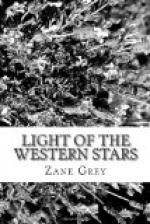“By Gawd!” ejaculated Monty Price, who seemed to be the most amazed and elated of them all. “Thet’s the fust Englishman I ever seen! He’s orful deceivin’ to look at, but I know now why England rules the wurrld. Jest take a peek at thet bronco. His spirit is broke. Rid by a leetle English dook no bigger ’n a grasshopper! Fellers, if it hain’t dawned on you yit, let Monty Price give you a hunch. There’s no flies on Castleton. An’ I’ll bet a million steers to a rawhide rope thet next he’ll be throwin’ a gun as good as Nels.”
It was a distinct pleasure for Madeline to realize that she liked Castleton all the better for the traits brought out so forcibly by his association with the cowboys. On the other hand, she liked the cowboys better for something in them that contact with Easterners brought out. This was especially true in Stewart’s case. She had been wholly wrong when she had imagined he would fall an easy victim to Dorothy’s eyes and Helen’s lures. He was kind, helpful, courteous, and watchful. But he had no sentiment. He did not see Dorothy’s charms or feel Helen’s fascination. And their efforts to captivate him were now so obvious that Mrs. Beck taunted them, and Edith smiled knowingly, and Bobby and Boyd made playful remarks. All of which cut Helen’s pride and hurt Dorothy’s vanity. They essayed open conquest of Stewart.
So it came about that Madeline unconsciously admitted the cowboy to a place in her mind never occupied by any other. The instant it occurred to her why he was proof against the wiles of the other women she drove that amazing and strangely disturbing thought from her. Nevertheless, as she was human, she could not help thinking and being pleased and enjoying a little the discomfiture of the two coquettes.
Moreover, from this thought of Stewart, and the watchfulness growing out of it she discovered more about him. He was not happy; he often paced up and down the grove at night; he absented himself from camp sometimes during the afternoon when Nels and Nick and Monty were there; he was always watching the trails, as if he expected to see some one come riding up. He alone of the cowboys did not indulge in the fun and talk around the camp-fire. He remained preoccupied and sad, and was always looking away into distance. Madeline had a strange sense of his guardianship over her; and, remembering Don Carlos, she imagined he worried a good deal over his charge, and, indeed, over the safety of all the party.
But if he did worry about possible visits from wandering guerrillas, why did he absent himself from camp? Suddenly into Madeline’s inquisitive mind flashed a remembrance of the dark-eyed Mexican girl, Bonita, who had never been heard of since that night she rode Stewart’s big horse out of El Cajon. The remembrance of her brought an idea. Perhaps Stewart had a rendezvous in the mountains, and these lonely trips of his were to meet Bonita. With the idea hot blood flamed into Madeline’s cheek. Then she was amazed at her own feelings—amazed because her swiftest succeeding thought was to deny the idea—amazed that its conception had fired her cheek with shame. Then her old self, the one aloof from this red-blooded new self, gained control over her emotions.




